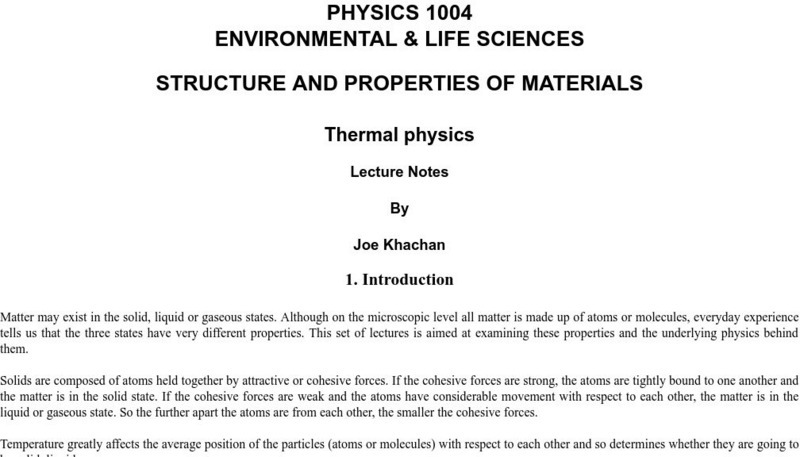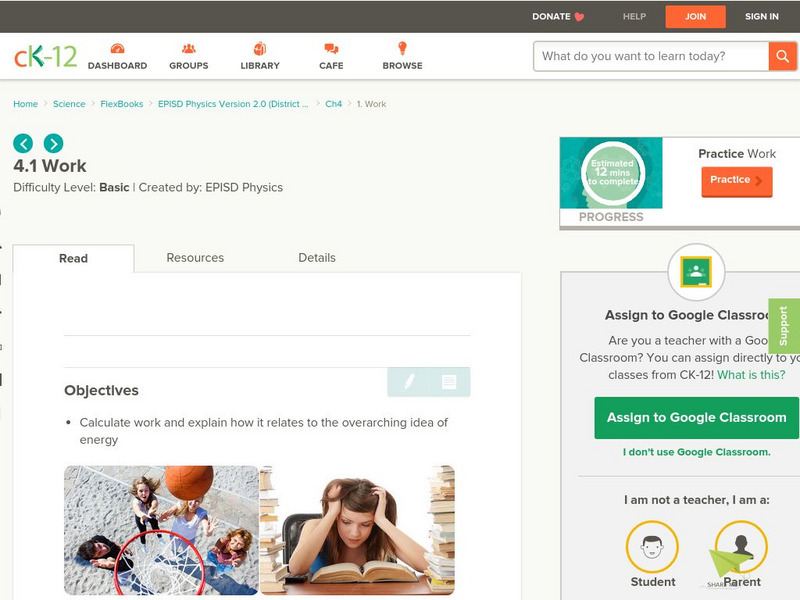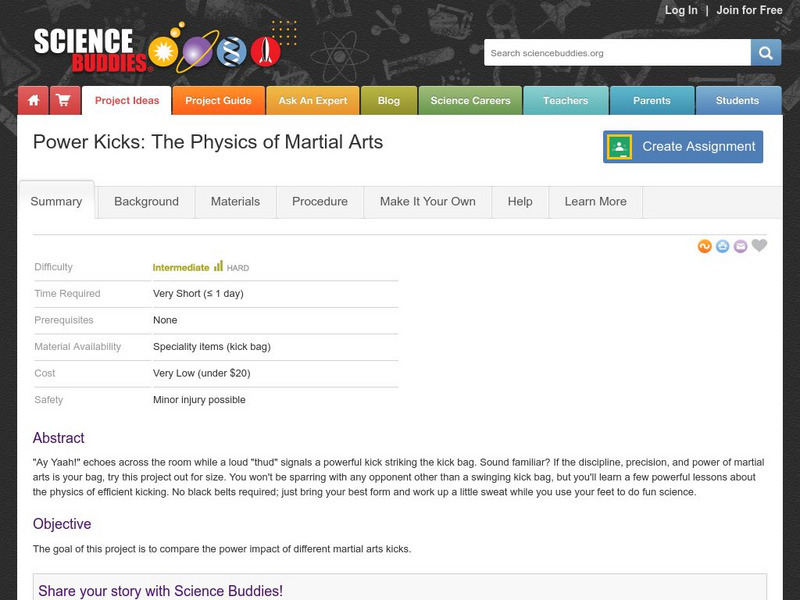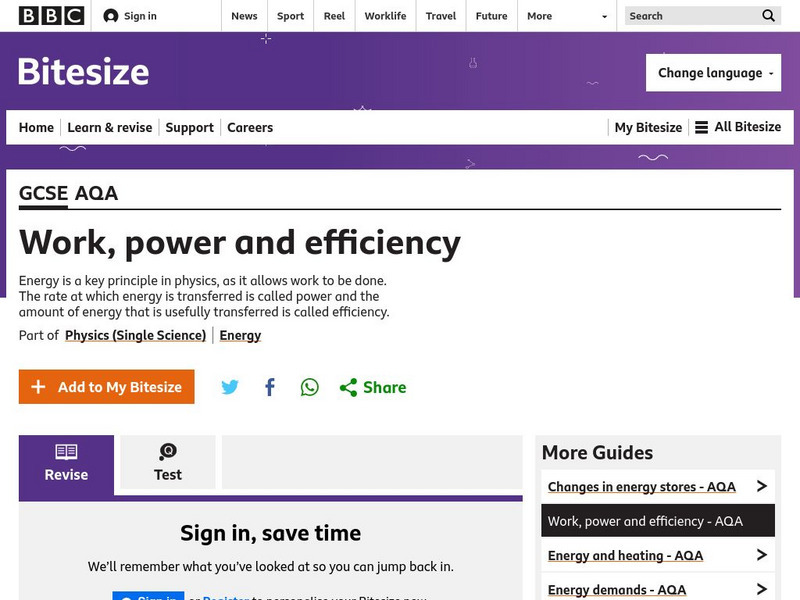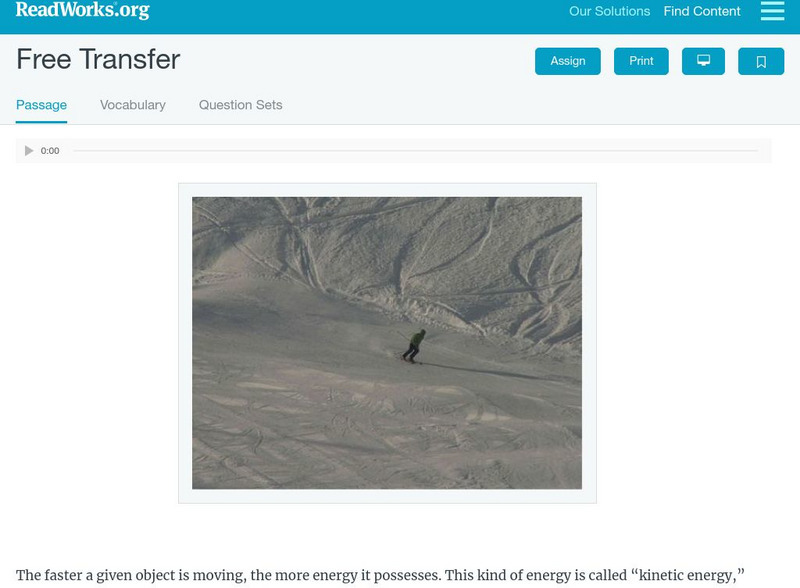Physics Classroom
The Physics Classroom: Work and Energy: Which Path Requires the Most Energy?
Suppose that a car traveled up three different sloped roadways from the base of a mountain to the summit of the mountain. Which path would require the most energy? See this animation and explanation for help.
Physics Classroom
The Physics Classroom: Work and Energy: Stopping Distance of a Hot Wheels Car
Students can analyze an animation of a Hot Wheels car and use the principles of work and energy to answer the given questions.
Physics Classroom
The Physics Classroom: Work and Energy: How High Will It Go?
This animation depicts the motion of a young child sliding across the snow on a sled. Students can analyze the work and energy involved in this scenario.
Physics Aviary
Physics Aviary: Work to P Ee Lab
This lab is designed to have students discover the relationship between the work that is done and the stretch of a spring. Students will get the area under a Force/Stretch graph to find the work given to a spring for a given situation....
Physics Classroom
The Physics Classroom: Work and Energy: Energy Transformation on Roller Coasters
Using a roller coaster as an example, the transformation of mechanical energy from the form of potential to the form of kinetic and vice versa is explained and illustrated in the animation.
Khan Academy
Khan Academy: Rollercoasters Are Energy at Work!
This passage will test your knowledge on work and energy.
Texas Education Agency
Texas Gateway: Work, Energy, and Power in Humans
By the end of this section, you will be able to explain the human body's consumption of energy when at rest versus when engaged in activities that do useful work and to calculate the conversion of chemical energy in food into useful work.
CK-12 Foundation
Ck 12: Physical Science: Energy
[Free Registration/Login may be required to access all resource tools.] Discusses the definition of energy, the SI unit, and the seven different forms of energy.
Read Works
Read Works: Electricity & Energy Energy
[Free Registration/Login Required] An informational text about energy. A question sheet is available to help students build skills in reading comprehension.
University of Sydney (Australia)
University of Sydney: Structure and Properties of Materials/thermal Physics
An exhaustive set of "lecture notes" on various topics in thermal physics (including thermal expansion). Explanations are well done and more interesting than most. Includes both a mathematical and conceptual treatment of topics. Humor,...
Massachusetts Institute of Technology
Mit: Open Course Ware: Force and Potential Energy
The activity investigates conservation of energy. Some topics explored are friction, kinetic energy, conservation of energy, and potential energy. The resource consists of video clips, lecture notes, practice problems, and exam...
Khan Academy
Khan Academy: What Is Elastic Potential Energy?
This site explains and gives examples of elastic potential energy and how to calculate it.
CK-12 Foundation
Ck 12: Physical Science: Heat Conduction
[Free Registration/Login may be required to access all resource tools.] Investigates what conduction is, how it works, and gives examples of conduction.
Physics Aviary
Physics Aviary: Work to Ke Lab
This lab is designed to have students discover the relationship between the work that is done by a force and the speed gained by the object experiencing the force. Students can adjust the strength of the force. They can decide how much...
CK-12 Foundation
Ck 12: Work
[Free Registration/Login may be required to access all resource tools.] In this online lesson students will learn to calculate work and explain how it relates to the overarching idea of energy.
University of California
University of California Los Angeles: Force, Work and Power
Describes the definition and relationships between force, work and power. Includes nice drawings to increase conceptual understanding.
Physics Classroom
The Physics Classroom: Work, Energy, and Power: Internal vs. External Forces
Through illustrated examples and interactive examples, students learn about the two categories of forces are referred to as internal forces and external forces.
Science Buddies
Science Buddies: Power Kicks: The Physics of Martial Arts
If the discipline, precision, and power of martial arts is your bag, try this project out for size. You won't be sparring with any opponent other than a swinging kick bag, but you'll learn a few powerful lessons about the physics of...
Other
Fearof Physics: Videos
Looking for some more explanantion on a topic covered in physics class? This site contains videos that explore some physics concepts. Videos are broken down by topics. Some videos also give examples on how to solve problems.
Other
Wikibooks: Physics Study Guide
A handy resource that gives an overview of equations and definitions pertinent to an introductory, college-level physics course, with two of its three sections focusing on motion-related topics and principles.
TeachEngineering
Teach Engineering: Work and Power: Waterwheel
Investigating a waterwheel illustrates to students the physical properties of energy. They learn that the concept of work, force acting over a distance, differs from power, which is defined as force acting over a distance over some...
BBC
Bbc: Gcse Bitesize: Work, Power and Efficiency
This lesson focuses on energy and power. Energy is a key principle in physics, as it allows work to be done. The rate at which energy is transferred is called power and the amount of energy that is usefully transferred is called...
Georgia State University
Georgia State University: Hyper Physics: First Law of Thermodynamics
At this site from Georgia State University the first law of thermodynamics is stated and explained. The meaning of internal energy and enthalpy is discussed. Equations are given and the importance of a system analysis is discussed.
Read Works
Read Works: Free Transfer
[Free Registration/Login Required] This passage discusses different types of energy transfer. This text is a stand-alone curricular piece that reinforces essential reading skills and strategies and establishes scaffolding for vocabulary...







